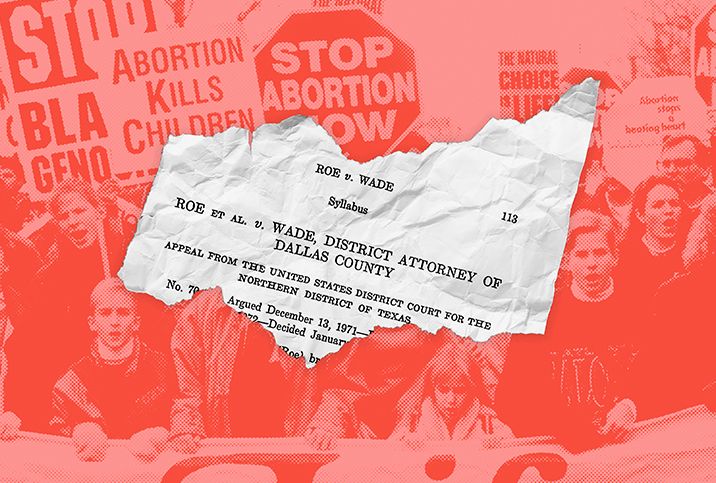How the Overturning of Roe Impacts IVF procedures

Nathalie Santa Maria and her husband have been trying to conceive since 2019, but their fertility journey came to a halt after the overturning of Roe v. Wade, which put abortion access in the hands of the states. Both patients and many experts fear that several procedures associated with in vitro fertilization (IVF) could be affected by the Supreme Court's June 2022 decision. As a result, Santa Maria is no longer confident she'll be able to access procedures she might need for conception.
"The last three years have been an awful experience dealing with the reproductive health system, most of which insurances don't cover,” said Santa Maria, of North Carolina. "Now, with Roe overturned, we've decided to completely pause all family planning; far too many legislation hurdles to risk my life and take a $30,000 gamble."
She added that the "deeply personal" choice partially stems from the increased risk of ectopic pregnancy with IVF, which is even higher for her after a past surgery, along with not having a healthcare provider she trusts if something goes wrong.
Santa Maria isn't alone. People who hope IVF leads to their dream of having a child may be hesitating and postponing plans in states that are restrictive or vacillating with regard to abortion.
An elevated risk of ectopic pregnancy
In the wake of the Supreme Court's decision, questions are being raised about when and how an ectopic pregnancy is allowed to be treated. In many states with restrictive abortion laws, there are still exceptions for medical emergencies, including ectopic pregnancies.
An ectopic pregnancy occurs when a fertilized egg implants outside of the uterus. The pregnancy is never viable in this situation. However, depending on when the ectopic pregnancy was discovered, cardiac electrical activity may be detected, which raises complications regarding "fetal heartbeat" laws in some states.
An ectopic pregnancy is always an emergency to the parent, stated Cindy Duke, M.D., an OB-GYN in Las Vegas. While Santa Maria has an exceptionally elevated risk of ectopic pregnancy, all parents-to-be using IVF for pregnancy have 2.5 percent to 3 percent higher incidences of it, Duke explained.
"With IVF, we're putting in an embryo into the top of the womb, and the embryo can still float its way over to the fallopian tubes. It can also embed into what's known as a really thin part of the uterus…a very, very dangerous type of ectopic," Duke added.
As Duke explained, however, it's now much more complicated to define an emergency in the post-Roe era. Confusion from providers on when they are allowed to help could result in a doctor waiting until the pregnant person is in serious distress to remove the ectopic pregnancy, even though there is no chance of viability. This scenario would endanger the pregnant person unnecessarily, making it a risk some people, like Santa Maria, aren't willing to take. Ultimately, some cases could result in organ damage or unnecessary death. A research article published in 2021 in Duke University Press predicted a total abortion ban would increase pregnancy-related deaths in the United States by 21 percent during the first few years.
The risk of not being able to use 'selective reduction'
One risk of IVF is that it increases the chance of carrying multiple babies. If one baby starts to pose a serious health risk, it could endanger the others as well. Duke explained that sometimes a "selective reduction" is suggested. In a post-Roe world, this action may be considered an abortion because it removes a living fetus, even though none of the fetuses would survive without this reduction.
In previous decades, fertility doctors implanted many embryos, hoping one or more would "take" and turn into viable babies, explained Betsy Greenleaf, D.O., an OB-GYN and advisor at pH-D Feminine Health in New Jersey.
"Gone are the days where you used to just put every embryo in there, [because] you get 'Octomom' [situations], so nobody really does that anymore," she explained.
Now, she said doctors typically try to implant just one or two embryos because they are able to do more chromosomal testing before implantation. But with the overturning of Roe v. Wade, some of those testing procedures that could result in eliminating embryos with chromosomal abnormalities might not be allowed anymore.
Embryos that hang in the balance
One of the great unknowns of a post-Roe world is what will happen to frozen embryos that are being stored in states, such as Oklahoma, that pass "personhood" bills. These bills say life starts at conception and could include frozen embryos, meaning that after a family successfully conceives, legal rights are extended to the extra embryos. Any stored embryos that the parents may have planned to donate to science or discard could now be considered people with legal rights preventing these options.
Some couples have been encouraged to go to fertility clinics and ask to adopt these embryos, however, embryo adoption isn't a widespread practice. It remains unclear what families might need to do with their extra embryos. Following the Roe decision, some couples transferred their embryos to freezing labs in states with fewer restrictions than their own.
"I think if you feel strongly that you want to move your embryos, I think do what's best for your mental health and your sense of well-being," Duke said. "I think what's lost to the people who are antiabortion, anti-IVF is they forget that on the other side, people creating embryos are literally creating embryos because they want to be parents—they want to raise a family, they want to raise healthy kids."
There might also be restrictions on the current practice of genetically testing embryos to select the strongest one to implant and eliminate the weaker ones, Duke explained. These weaker embryos often have anomalies that are likely to result in life-altering or fatal conditions.
For Santa Maria and others considering fertility options in a post-Roe era, options are more limited and hesitation runs deep. Some may pursue out-of-state treatment, some may wait for change, and others might have permanent impacts on their ability to grow their family.
Editors Note: Abortion is a medical procedure that is currently illegal or restricted in some portions of the United States. For more information about the legality of abortion in your area, please consult a local healthcare provider.


















